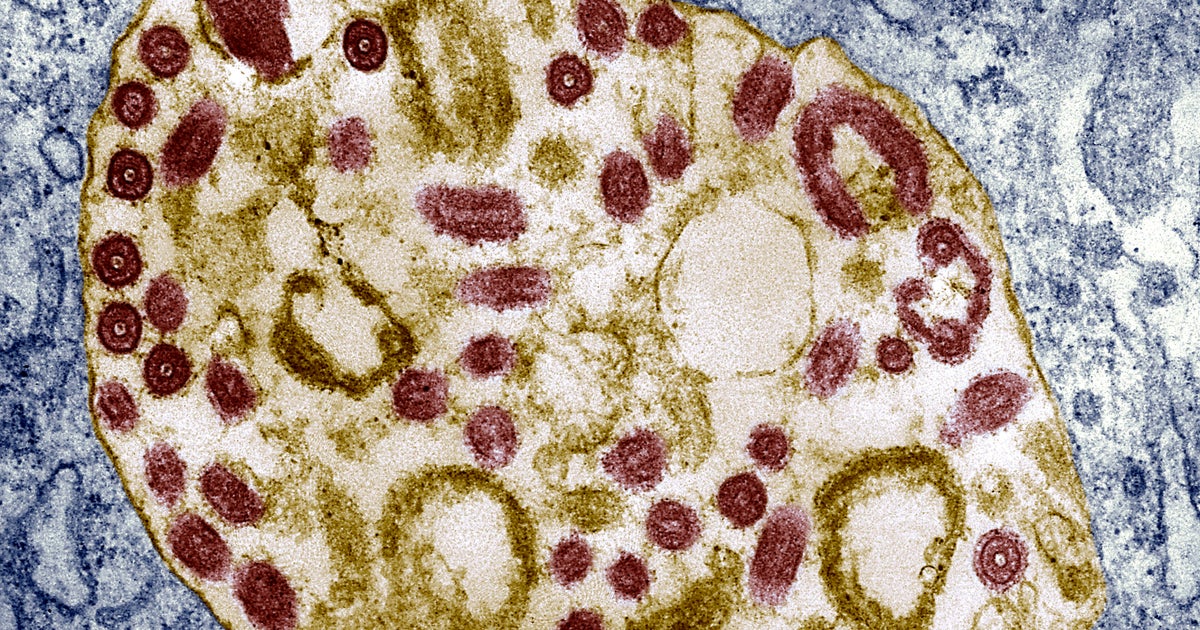CBS News
Marburg virus kills 8 in Rwanda. What to know about the Ebola-like outbreak and symptoms

Eight people have died in Rwanda from the highly contagious Marburg virus just days after the country declared an outbreak of the deadly hemorrhagic fever that has no authorized vaccine or treatment.
So far 26 cases have been confirmed in the country, health minister Sabin Nsanzimana said Sunday.
“Marburg is a rare disease,” Nsanzimana told journalists. “We are intensifying contact tracing and testing to help stop the spread.”
He said the source of the disease has not been determined yet.
Previous Marburg cases and outbreaks have been recorded in Tanzania, Equatorial Guinea, Angola, Congo, Kenya, South Africa, Uganda and Ghana, according to the World Health Organization.
Here’s what else to know about the disease.
What causes Marburg virus?
Like Ebola, the Marburg virus originates in fruit bats. It can spread between people through close contact with the bodily fluids of infected individuals or with surfaces, such as contaminated bed sheets, clothing, needles or medical equipment.
The World Health Organization notes that Marburg virus does not spread through the air.
The rare virus was first identified in 1967 after it caused simultaneous outbreaks of disease in laboratories in Marburg, Germany, and Belgrade, Serbia. Seven people died who were exposed to the virus while conducting research on monkeys.
Marburg virus symptoms
According to the Centers for Disease Control and Prevention, symptoms of Marburg virus include:
- fever
- chills
- headache
- muscle pain
- rash
- chest pain
- sore throat
- diarrhea
- vomiting
- stomach pain
- unexplained bleeding or bruising
“In later stages of the disease, bleeding from various sites such as the gums, nose and anus can occur. Patients can suffer shock, delirium and organ failure,” WHO says.
Without treatment, Marburg can be fatal in up to 88% of people who fall ill with the disease. There are currently no approved vaccines or treatments specifically for this virus.
A person infected with the virus can take between three days and three weeks to show symptoms, Nsanzimana added.
CBS News
Here’s what a $25,000 home equity loan costs monthly now that rates were cut

Getty Images
Home equity borrowing has traditionally been one of the most cost-effective ways to access extra money. But, in recent years, it’s been one of the only ways to do so. With inflation surging and interest rates soaring in response, borrowing costs rose accordingly, sometimes in an exponential fashion as homebuyers saw with mortgage interest rates. Rates on home equity loans and home equity lines of credit (HELOCs), while not quite immune from this trend, tended to stay in the single digits. And they’re coming down again now that the Federal Reserve issued a rate cut in mid-September.
For those homeowners looking for a relatively modest sum of $25,000, then, it makes sense to start crunching these potential costs. Just note that some lenders will require a larger sum to approve your application. But even if you find a lender who will offer this loan amount, it doesn’t mean that you should act without doing the math first. To that end, below we’ll calculate exactly how much a $25,000 home equity loan will cost monthly now that interest rates have been reduced.
See how low of a home equity loan rate you could secure online now.
Here’s what a $25,000 home equity loan costs monthly now that rates were cut
The average home equity loan interest rate as of October 2 is 8.39%, but it’s a bit higher for two common repayment terms: 10-year and 15-year loans. Here’s what a $25,000 home equity loan would cost with the average rates tied to those repayment terms:
- 10-year fixed home equity loan at 8.50%: $309.96 per month
- 15-year fixed home equity loan at 8.41%: $244.87 per month
While these rates may not be quite as low as borrowers would prefer right now, it’s critical to compare the alternatives. And, unfortunately, they’re not very attractive right now.
HELOCs, for example, currently come in at almost half a percentage point higher (8.94%). Cash-out refinancing, meanwhile, would have you lose your existing, presumably lower mortgage rate in exchange for the extra money. Personal loan rates could also soon be declining but are still averaging close to 13% now, while credit card interest rates are right around a record 23%.
So, sure, calculate borrowing $25,000 with those alternatives. But, right now, a home equity loan is likely to be your cheapest option.
Learn more about your current home equity loan options here now.
The bottom line
A $25,000 home equity loan could cost borrowers between $245 and $310 per month right now, post-rate cut. But remember that home equity loan interest rates are fixed. If they fall after you’ve opened your loan, your rate will remain the same. So it’s important to weigh the potential for rate cuts against what can be locked in right now. And, if you think that rate cuts to come could be significant, it may be worth opening a HELOC instead. Rates on that product will adjust monthly on their own and it won’t require the refinancing (and refinancing costs) a home equity loan will.
CBS News
What’s next for Trump, Harris after VP debate?

Watch CBS News
Be the first to know
Get browser notifications for breaking news, live events, and exclusive reporting.
CBS News
Doctor admits to role in Matthew Perry’s death, pleads guilty to federal ketamine charge

A doctor criminally charged in connection with the death of Matthew Perry pleaded guilty Wednesday to a federal charge of conspiracy to distribute ketamine, which carries a maximum possible sentence of 10 years in prison.
Mark Chavez agreed to surrender his medical license after being charged in connection with the actor’s death in August, along with four other defendants including another doctor who federal prosecutors say conspired with him to deal an illegal, unethical and dangerous amount of ketamine to Perry in the last month of his life.
Chavez previously agreed to plead guilty. On Wednesday, he entered a guilty plea in U.S. District Court in Los Angeles.
KCAL News
The other people charged in Perry’s death include the L.A.-area physician accused of conspiring with Chavez, Salvador Plasencia, Jasveen Sangha — an alleged North Hollywood drug dealer who prosecutors have said is known as the “Ketamine Queen” — Perry’s former live-in assistant, Kenneth Iwamasa, and Erik Fleming, a Hawthorne man federal authorities have described as a street dealer who acted as a middleman.
In a plea agreement, Chavez admitted to taking ketamine and other prescription drugs from a ketamine infusion clinic in San Diego where he used to work. He also confessed to falsifying a prescription to provide Perry with the drug; using a patient’s name to have the prescription filled without that person’s consent or knowledge and making false statements to a wholesale ketamine distributer so he could supply more of it to Perry.
Nine days before Perry died, on Oct. 19, 2023, Chavez was interviewed by investigators with the Medical Board of California and the U.S. Drug Enforcement Agency, according to federal prosecutors. When he spoke with them, he concealed the fact that he had distributed ketamine to Plasencia who then allegedly provided the drug to Perry, prosecutors said.
KCAL News
The plea agreement states that Chavez is aware that the federal charge he is agreeing to plead guilty to, conspiracy to distribute ketamine, carries a maximum possible sentence of 10 years imprisonment, 3 years of supervised release and a fine of $500,000 — or twice the gross gain or gross loss due to offense depending on which is greater — as well as a mandatory assessment of $100.
On Aug. 30, Chavez appeared in U.S. District Court in Los Angeles but did not enter a plea at the time. He had previously agreed to plead guilty to his role in Perry’s death.
While he avoided questions from reporters as he entered the court in August, his attorney, Matthew Binninger, spoke outside the courthouse afterwards.
“He’s incredibly remorseful for what happened — not just because it happened to Matthew Perry but because it happened to a patient,” Binninger said. “He’s trying to do everything in his power to right the wrong that happened here.”
Just days before Chavez appeared in court, his physician’s license had been suspended and he was not permitted to practice, according to records from the Medical Board of California.











